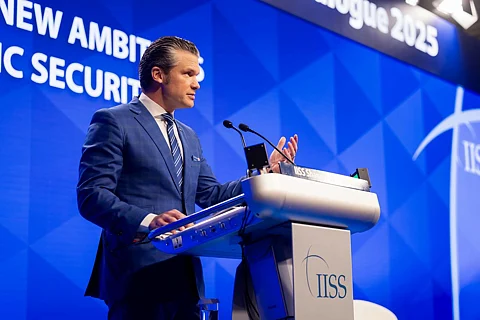

U.S. Secretary of Defense Pete Hegseth warned on Saturday that China poses a potentially imminent threat to Taiwan, urging Asian countries to boost defense spending and deepen military cooperation with the United States to prevent conflict in the Indo-Pacific.
Speaking at the Shangri-La Dialogue in Singapore, Hegseth said Beijing is “credibly preparing to potentially use military force to alter the balance of power,” referencing long-standing U.S. assessments that Chinese President Xi Jinping has set 2027 as a target for the military to be ready to invade Taiwan.
“There’s no reason to sugarcoat it,” Hegseth said. “The threat China poses is real—and it could be imminent. We hope not, but it certainly could be.”
China swiftly condemned Hegseth’s remarks, calling the U.S. “the biggest troublemaker” for regional peace. In a statement posted by the Chinese embassy in Singapore, Beijing accused Washington of deploying offensive weapons and conducting provocative surveillance operations in the South China Sea.
“The U.S. claims to safeguard peace, but it offers the world only uncertainty,” the embassy said.
China, which has historically used the Shangri-La Dialogue to engage regional audiences, sent a lower-level delegation this year and abruptly canceled its scheduled speech without explanation. The move was widely interpreted as a deliberate snub amid rising tensions with Washington.
Hegseth pressed Asian nations to increase defense spending, pointing to Europe—particularly NATO allies—as an example. “Europe is stepping up. Indo-Pacific allies can and should follow suit,” he said, citing the urgency of deterring China and other regional threats like North Korea.
“Deterrence doesn’t come on the cheap… time is of the essence,” he added. He praised European countries such as Estonia for meeting spending targets and urged Asian partners to become “partners, not dependents.”
Hegseth warned that deepening economic ties with China could become a vulnerability, stating Beijing often uses economic leverage to advance its strategic aims. He emphasized that Washington’s goal is not to impose values but to work pragmatically with like-minded nations.
The speech drew sharp criticism from U.S. Senator Tammy Duckworth, a Democrat and co-leader of the bipartisan delegation in Singapore. She called Hegseth’s remarks “patronizing,” particularly his pledge to “wrap our arms around our friends.”
“We don’t need that kind of language,” she told reporters. “We need to stand together. America isn’t asking countries to choose between China and the U.S., but to help uphold international norms.”
Duckworth also questioned the Trump administration’s consistency and competence, calling their foreign policy “impulsive” and politically driven.
Her remarks contrasted with praise from Republican lawmakers in the delegation. Representatives Brian Mast and John Moolenaar said Asian officials welcomed the U.S. commitment to regional security and viewed China’s military assertiveness with increasing alarm.
Hegseth framed his speech as part of a broader Trump administration push to reorient U.S. global priorities. He reiterated the president’s pledge to increase defense spending by 13% to over $1 trillion next year and touted plans for a live-fire test of a new mid-range missile system in Australia.
“We are not here to preach about climate change or cultural issues,” he said, contrasting the Trump administration’s pragmatic approach with what he described as “moralistic” past policies.
Comparing Trump to Singapore’s founding prime minister Lee Kuan Yew, Hegseth said the administration seeks “common sense” diplomacy over ideological confrontation.
However, experts note that while Hegseth’s rhetoric may resonate with some regional governments, actual commitments to increased military spending across Asia remain uncertain. “The Trump administration is more insistent and demands more,” said Ian Chong, a non-resident scholar at Carnegie China. “Asian governments will listen—but how much they will comply is a different story.”